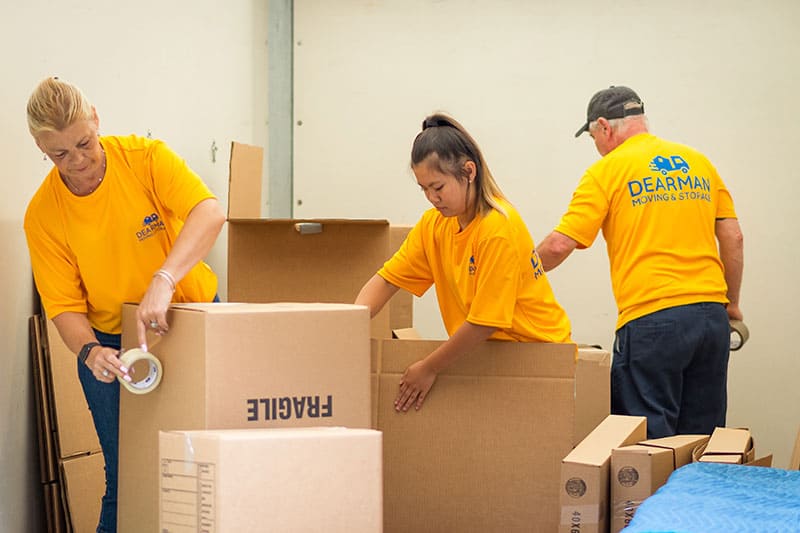Understanding the Inclusions of moving and Freight Forwarding on the planet of Domestic and Worldwide Delivery
Guiding via the complexities of moving and Freight forwarding can be challenging. Both procedures entail unique treatments and needs that are crucial for effective transport. Understanding the differences in logistics, documentation, and danger management is necessary for people and services alike. This understanding can considerably influence the efficiency and safety of deliveries. Numerous are uninformed of the particular components that affect the general experience and results. What elements should one take into consideration to assure a smooth transition?
The Basics of moving and Freight Forwarding
moving and Freight forwarding are essential parts of the global logistics industry. They promote the transfer of goods and personal valuables throughout worldwide and domestic boundaries. moving largely includes the moving of people or family members, incorporating domestic and commercial needs. It typically consists of packaging, packing, moving, and unloading things at the location. In contrast, Freight forwarding is focused on the delivery of goods, usually wholesale, utilizing numerous transportation settings, such as land.freight, sea, or air forwarders work as intermediaries, working with logistics to guarantee prompt delivery while navigating via facility laws and customizeds treatments. Both procedures require mindful planning, company, and communication to assure performance and decrease disturbances. Comprehending these principles is vital for any individual included in logistics, as they prepared for advanced elements of shipping and transportation management.
Secret Components of Freight Forwarding Solutions
Freight forwarding solutions incorporate several essential parts that ensure smooth transport of goods. Key duties of Freight forwarders include handling logistics, working with shipments, and taking care of personalizeds clearance. Additionally, recognizing crucial shipping documents is imperative for compliance and reliable motion of cargo.
Freight Forwarder Responsibilities
A trustworthy Freight forwarder plays a crucial function in collaborating the transport of items, making certain that deliveries are handled efficiently and in compliance with regulations. Their responsibilities include numerous essential jobs, consisting of selecting ideal transport courses, bargaining Freight prices, and taking care of logistics. They serve as middlemans in between shippers and carriers, ensuring that cargo is appropriately packaged and labeled for risk-free transportation. Furthermore, Freight forwarders track shipments, offering updates to clients about the status and anticipated distribution times. They also assess and manage dangers connected with transport, advising insurance coverage choices as required. By assisting in communication and documents, Freight forwarders enhance the delivery process, minimizing prospective delays and enhancing total supply chain effectiveness.
Shipping Paperwork Basics

Recognizing Personalizeds Clearance and Paperwork
Accurate documentation is essential in the customizeds clearance procedure, as it guarantees compliance with various regulations. A summary of customs guidelines highlights the complexities dealt with by shippers and Freight forwarders. Usual clearance challenges can greatly affect delivery timelines and prices, making understanding this facet necessary for reliable logistics.
Importance of Accurate Documents
Guiding via the intricacies of international shipping needs an eager understanding of customs clearance and the essential role of documentation. Accurate paperwork is important for ensuring that deliveries conform with policies and reach their locations immediately. Effectively prepared records, consisting of bills of lading, industrial invoices, and packaging listings, help with smooth interactions with customs authorities. Inaccuracies can cause delivery delays, penalties, and even confiscation of items. Complete paperwork aids in tracking deliveries and fixing disputes. Businesses involved in moving and Freight forwarding must prioritize meticulous documents practices to browse the complex landscape of international delivery successfully. This diligence not only streamlines procedures yet additionally boosts customer contentment by ensuring timely delivery.
Customs Rules Introduction
Guiding personalizeds guidelines is an important aspect of worldwide profession that directly influences the success of moving and Freight forwarding operations. Efficient customizeds clearance needs an understanding of different guidelines, including tolls, tasks, and import/export constraints. Exact documentation is important, as it ensures compliance with legal demands and promotes the effective movement of products across borders. Key files frequently include industrial invoices, packaging checklists, and expenses of lading, which give thorough details about the delivery. Additionally, custom-mades brokers play a critical role in steering intricate regulations, functioning as middlemans in between carriers and custom-mades authorities. By keeping extensive understanding of customizeds processes, companies can substantially minimize delays and decrease costs connected with worldwide delivery.
Common Clearance Challenges
Many obstacles can emerge during the custom-mades clearance procedure, commonly making complex the motion of goods across boundaries. One significant issue is insufficient paperwork, which can bring about hold-ups and fines. Importers and exporters need to ensure all required documentation, such as billings, packing lists, and certifications of beginning, is total and accurate. Furthermore, disparities in valuation can set off scrutiny from personalizeds authorities, leading to added responsibilities or evaluations. Language obstacles might likewise position challenges, as miscommunication can cause misconceptions concerning regulations. Changes in customizeds guidelines can create confusion, demanding continuous caution by shippers. Inevitably, getting rid of these clearance tests needs complete prep find out work and a clear understanding of customs demands to promote smooth worldwide purchases.
Packaging and Identifying Demands
Although frequently forgotten, product packaging and labeling demands play an essential function in the shipping procedure, making certain that items are shielded and quickly identifiable throughout their trip. Proper packaging safeguards items from damage throughout transit, while additionally promoting effective handling and storage. Using ideal products, such as bubble wrap, foam, or durable boxes, can prevent damage and loss.Labeling is similarly vital. Clear and precise labels convey vital info, including the location, taking care of guidelines, and components. Labels should abide by laws details to residential and global shipping, which may consist of dangerous products recognition or personalizeds declarations.Moreover, standardized labeling practices simplify the monitoring procedure and improve total logistics effectiveness. By adhering to Source product packaging and labeling needs, organizations decrease the threat of hold-ups, damage, or misdelivery. Ultimately, these techniques contribute significantly to the success of moving and Freight forwarding operations, ensuring a smooth shipping experience for all celebrations entailed
Tracking Shipments: Importance and Techniques
Efficient packaging and labeling set the foundation for successful delivery management, but tracking deliveries is similarly essential in the shipping procedure. Delivery tracking provides real-time exposure, which aids services and customers monitor the progression of their items. This openness improves client contentment, given that customers can stay notified about shipment timelines and any kind of prospective delays.Several techniques promote reliable tracking. Barcode scanning is a common strategy, making use of unique identifiers to monitor bundles throughout their trip. Furthermore, GPS modern technology enables specific location monitoring, enabling for prompt updates and boosted logistics management. Numerous shipping business now supply electronic systems and mobile applications that provide customers with simple accessibility to tracking information.The value of delivery monitoring can not be overstated; it minimizes the danger of shed or damaged items, enhances functional effectiveness, and fosters trust between carriers and recipients. Incorporating efficient tracking techniques is crucial for effective domestic and worldwide shipping operations.
Insurance policy Options for Your Item
Securing insurance coverage for goods en route is a crucial consideration for organizations and individuals alike. Insurance policy alternatives vary based on the sort of delivery, value of products, and certain threats involved. Usual types consist of service provider responsibility, which covers loss or damage while in transit, and full-value insurance, supplying substantial coverage for the overall worth of the goods.Shippers might likewise consider marine insurance coverage for worldwide shipments, shielding against dangers connected with sea transportation. It is necessary to analyze the specific needs of the delivery and review the conditions of any type of policy.Furthermore, comprehending exemptions and limitations is critical to avoid possible voids in insurance coverage. Carriers must engage with insurance policy experts to discover customized options that fit their special situations. Ultimately, buying the right insurance coverage can mitigate economic threats and offer comfort throughout the delivery process.
Picking the Right moving and Freight Forwarding Service
When selecting a moving and Freight forwarding solution, it is crucial for companies and people to very carefully review their particular needs and concerns. Elements such as the quantity of products, destination, and timeline play a substantial function in this decision-making process. Researching numerous providers is recommended; comparing their solutions, rates, and customer reviews can disclose important insights.Additionally, it is needed to take right into account the experience and know-how of the solution company in managing certain kinds of freight, specifically for worldwide shipments that might entail customs clearance. Transparency in pricing, including any get more kind of concealed charges, must also be scrutinized.Furthermore, evaluating the level of client support supplied is essential, as prompt interaction can reduce problems during transportation (international shipping). Validating the schedule of insurance options assures that products are protected throughout the shipping procedure. By taking these steps, businesses and individuals can make enlightened choices that align with their logistics demands
Frequently Asked Questions
What Sorts Of Item Can Be Shipped Worldwide?

Just How Do Shipping Prices Range Different Providers?
Delivering prices differ substantially between service providers due to elements such as solution speed, freight kind, distance, and additional services supplied. Each service provider's rates version reflects these variables, influencing general shipping expenditures for clients.
Can I Ship Hazardous Materials or Perishables?
Shipping unsafe products and perishables goes through rigorous regulations. Providers often call for particular product packaging, labeling, and paperwork. Shippers should assure conformity with global and regional laws to prevent penalties and guarantee risk-free transport.
What Should I Do if My Shipment Is Postponed?
When encountered with a delivery delay, one should initially get in touch with the provider for updates. Evaluate any type of notices got, evaluate alternative remedies, and maintain all parties informed about the situation to lessen disturbances.
Are There Weight Boundary for Shipping Containers?
Weight limitations for delivery containers vary relying on aspects like container dimension and delivery laws. Usually, conventional containers have an optimum gross weight of around 30,000 to 32,000 kilos to assure risk-free transport and handling. In comparison, Freight forwarding is focused on the shipment of products, often in bulk, using numerous transport modes, such as air, sea, or land.Freight forwarders act as middlemans, coordinating logistics to ensure prompt shipment while steering through complex regulations and customs procedures. Key obligations of Freight forwarders consist of managing logistics, collaborating shipments, and managing personalizeds clearance. A trustworthy Freight forwarder plays an important duty in collaborating the transport of goods, making sure that deliveries are managed effectively and in compliance with guidelines. Efficient product packaging and labeling established the foundation for effective delivery monitoring, but tracking shipments is just as necessary in the delivery process. Many delivery companies now offer electronic systems and mobile applications that supply users with very easy accessibility to tracking information.The value of shipment tracking can not be overstated; it decreases the risk of shed or harmed goods, boosts functional performance, and cultivates count on between recipients and carriers.